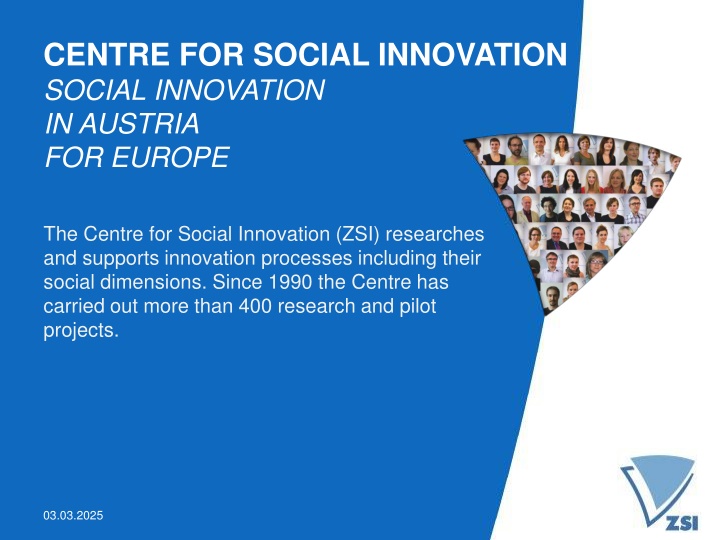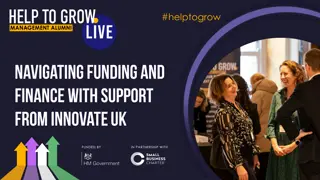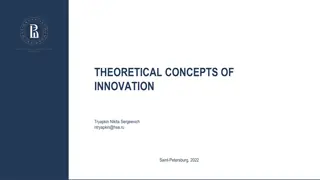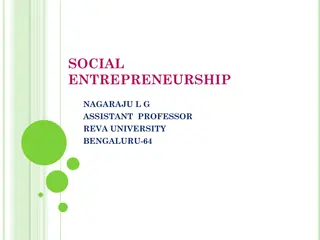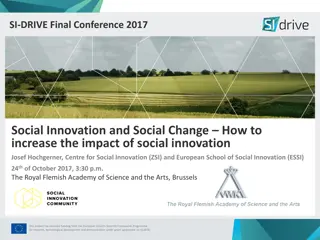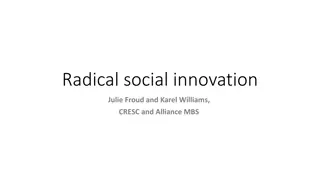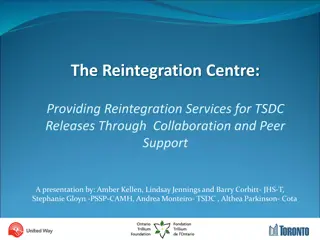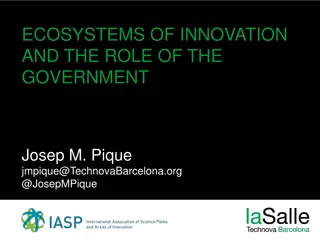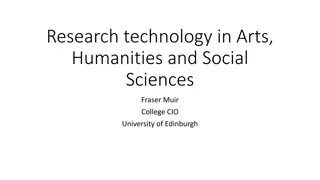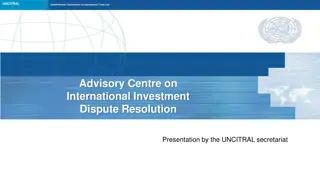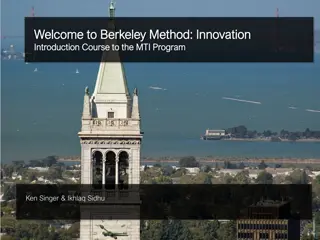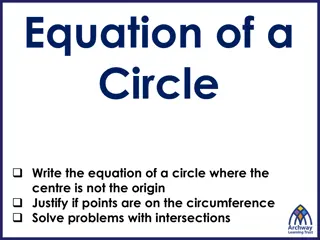CENTRE FOR SOCIAL INNOVATION
"The Centre for Social Innovation (ZSI) in Austria focuses on researching and supporting innovation processes with a social dimension. Established in 1990, ZSI has conducted over 400 projects, emphasizing socially relevant innovations and collaboration with various clients. ZSI's competences span societal challenges, technology, and regional development, underpinned by methodological expertise. The organization's tasks include impact assessment, ethics, and data management."
Download Presentation

Please find below an Image/Link to download the presentation.
The content on the website is provided AS IS for your information and personal use only. It may not be sold, licensed, or shared on other websites without obtaining consent from the author.If you encounter any issues during the download, it is possible that the publisher has removed the file from their server.
You are allowed to download the files provided on this website for personal or commercial use, subject to the condition that they are used lawfully. All files are the property of their respective owners.
The content on the website is provided AS IS for your information and personal use only. It may not be sold, licensed, or shared on other websites without obtaining consent from the author.
E N D
Presentation Transcript
CENTRE FOR SOCIAL INNOVATION SOCIAL INNOVATION IN AUSTRIA FOR EUROPE The Centre for Social Innovation (ZSI) researches and supports innovation processes including their social dimensions. Since 1990 the Centre has carried out more than 400 research and pilot projects. 03.03.2025
INTRODUCING ZSI OUR MISSION ALL INNOVATIONS ARE SOCIALLY RELEVANT. ZSI investigates and facilitates the social embedding and shaping of all kinds of innovations with particular emphasis on processes of social innovation. 03.03.2025
INTRODUCING ZSI BASIC FACTS II Legal status Private non-profit research organisation established in 1990 Self-governed, no external board no base funding FINANCIAL SOURCES: 3,5m in 2015, Staff: 60, all employed CLIENTS: ministries, municipalities, EC, OECD, ILO, other public bodies, NGOs; mostly R&D funding and contracts for intellectual services
INTRODUCINGZSI BASIC FACTS III Long term success of the ZSI is based on projects. Facts & figures* Current number: 63 Budget responsibility of: approx. Cooperation partners: Coordination: 03.03.2025
ZSI COMPETENCES AT A GLANCE Changes in work, labour markets and employment policy Social change in view of societal challenges Impact of international migration Social inclusion and equal opportunities Work and Equal Opportunities Citizen Science Science education Participatory technology creation and assessment Responsible research and innovation Technology and Knowledge National, regional and European STI policies Techno-globalisation and support for international STI cooperation Regional development Monitoring and evaluation Research and societal development 03.03.2025
ZSI METHODOLOGICAL COMPETENCES 03.03.2025
TASKS AND RESPONSIBILITIES IN REINFORCE WP 1 D1.2 Ethics Handbook and Data Management Plan (M8) WP2 Task 2.2 Task analysis (M2-6) -> contribution to D2.1 (M8) WP 9 Impact assessment D9.1 Impact Assessment Design (M7) D9.2 Instruments and User Guide (M12), D9.3 Progress Report (M26) and Final Report (M36) (???)
03.03.2025 Slide: 8 Author:
INSTRUMENTS 1. OUTPUT Reporting (number of workshops, number of participants, products, trainings, access data) 3. PARTICIPANTS SATISFACTION Online survey (needs to be translated??) 4. OUTCOMES Online survey (pre and post) (needs to be translated??) 7. IMPACT Self-reflection survey/Interviews with projects (middle- end)
TASKS ANALYSIS Target group (age, profession, recruitment, stakeholders), specific groups (elderly, visual impairment etc.) Task (contributory, collaborative, co-created) Requirement on participants side (e.g. computer, Internet, scientific skills, etc.) Duration of task Training (for teachers) What are the benefits for participants? What will participants learn? (scientific capital) How will the task contribute in achieving the goals e.g. knowledge aquisition Defining possible beahviour Scientifical benefit (objective 1) Ethical concerns? RRI related issues: gender equality, open access data, public engagement, science education excel file for all projects to be filled in
D1.2 ETHICS HANDBOOK AND DATA MANAGEMENT PLAN Ethics Committee (ETC) The ETC, led by ZSI, oversees ensuring compliance with regulations and ethical principles. It supervises privacy and data protection compliance and monitors the adherence of the results of the trials, where final users will be involved, to the ethical principles that will be defined at the very beginning of the project. The ETC of REINFORCE will be formed from the Ethics Manager, the representatives of EA and EGO (DoW, p.59). systematically design and implement an Ethics protocol the collection of personal data from users; the participation of adult users; the participation of under-age users (school students in particular ages 10-18 years old). (ethics review) vulnerable groups
NEXT STEPS WP 1: Setting up the Ethics Committee WP 1: Collecting ethical concerns WP 2: Tasks analysis in collaboration with WP leader WP 9: Call for contribution in setting impact framework
